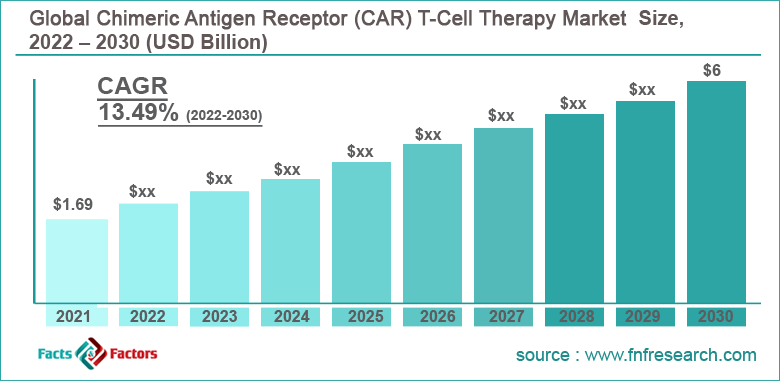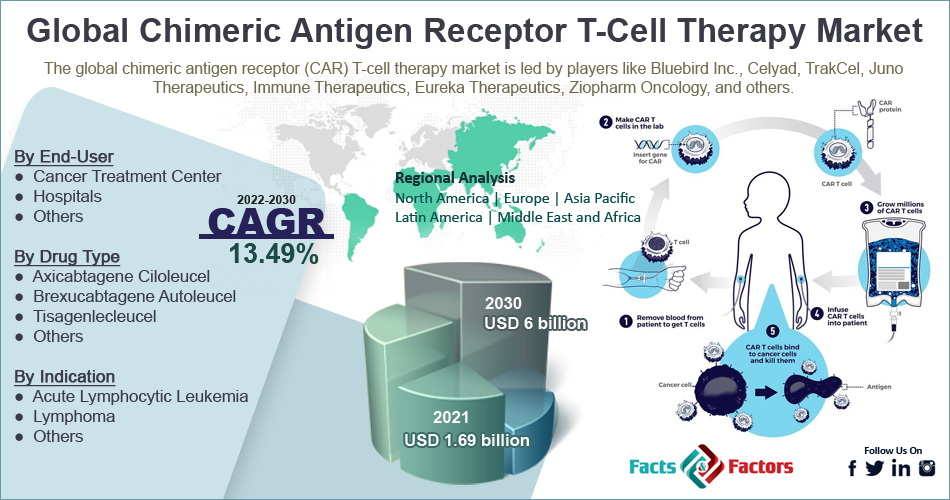Search Market Research Report
Chimeric Antigen Receptor (CAR) T-Cell Therapy Market Size, Share Global Analysis Report, 2022 – 2030

Chimeric Antigen Receptor (CAR) T-Cell Therapy Market Size, Share, Growth Analysis Report By End-User (Cancer Treatment Center, Hospitals, and Others), By Drug Type (Axicabtagene Ciloleucel, Brexucabtagene Autoleucel, Tisagenlecleucel, and Others), By Indication (Acute Lymphocytic Leukemia, Lymphoma, and Others), and By Region - Global and Regional Industry Insights, Overview, Comprehensive Analysis, Trends, Statistical Research, Market Intelligence, Historical Data and Forecast 2022 – 2030
Industry Insights
[210+ Pages Report] According to the report published by Facts Factors, the global chimeric antigen receptor (CAR) T-Cell therapy market size was worth around USD 1.69 billion in 2021 and is predicted to grow to around USD 6 billion by 2030 with a compound annual growth rate (CAGR) of roughly 13.49% between 2022 and 2030. The report analyzes the global chimeric antigen receptor (CAR) T-Cell therapy market drivers, restraints/challenges, and the effect they have on the demands during the projection period. In addition, the report explores emerging opportunities in the chimeric antigen receptor (CAR) T-Cell therapy market.

 Market Overview
Market Overview
The immunity system in living organisms works by tracking all the essential and common substances found in the body. If there is an addition of the substance that the body does not recognize, it leads to the immunity system attacking it. With this concept, the chimeric antigen receptor (CAR) T-cell therapy works by making the T-cells which are a type of white blood cells to fight cancer cells. This is achieved by modifying the T-cells in the laboratory which is meant to enable them in finding cancer cells and destroying them.
In some studies, CAR T-cell therapy is also called cell-based gene therapy but the main difference is that it involves changing the genes inside the T-cell to help counter cancer cells. The method can be used to treat different types of cancer and even in cases of other treatments that may have proven to be ineffective. In the therapy, T cells taken from the patients are genetically modified in a research facility by adding a gene for a chimeric antigen receptor or CAR.
 Key Insights
Key Insights
- As per the analysis shared by our research analyst, the global chimeric antigen receptor (CAR) T-Cell therapy market is estimated to grow annually at a CAGR of around 13.49% over the forecast period (2022-2030)
- In terms of revenue, the global chimeric antigen receptor (CAR) T-Cell therapy market size was valued at around USD 1.69 billion in 2021 and is projected to reach USD 6 billion, by 2030.
- The market is projected to grow at a significant rate due to the growing number of cancer patients across the globe
- Based on drug type segmentation, axicabtagene ciloleucel was predicted to show maximum market share in the year 2021
- Based on end-user segmentation, cancer treatment center was the leading application in 2021
- On the basis of region, North America was the leading revenue generator in 2021

 Growth Drivers
Growth Drivers
- Growth in the number of cancer patients to propel market demand
The global chimeric antigen receptor (CAR) T-cell therapy market is projected to grow owing to the increasing number of cancer patients across the globe. As per the World Health Organization (WHO), cancer is described as a large group of diseases that can start from an organ in the body and is caused due to the uncontrollable growth in the number of abnormal cells in the body. Cancer is the second leading cause of death observed globally and the number is as high as 9.8 million.
The most common types of cancer in men are liver, stomach, colorectal, prostate, and lung whereas women are more prone to breast, thyroid, cervical, and lung cancer. The disease does not have a completely effective treatment plan as of 2022 however, research for the same is underway and the scientific community remains hopeful. CAR T cell therapy is becoming a popular choice of treatment amongst medical professionals because of the short time required to conduct the entire process. The altered T-cells can be administered in a single infusion and require only 2 weeks of inpatient care unlike the harsh processes involved in other procedures like chemotherapy.
 Restraints
Restraints
- A possible side-effect to restrict market expansion
CAR T-cell therapy, although effective, has various side effects associated with its use. The intensity of the side effects can range from mild to serious and life-threatening. Hence it is important that the professionals handling the treatment are well-experienced and it should only be carried out in authorized treatment centers. As the CAR T-cells multiply, they can let out cytokines which is the possible cause of side effects like breathing issues, chills and high fever, fast heartbeat, feeling dizzy, tiredness, and joint or muscle pain.
 Opportunities
Opportunities
- Longer benefits to provide growth opportunities
CAR T-cells are living drugs and not artificially or synthetically created drugs. Studies have concluded that the effect of these drugs on the immunity system can last for a longer duration, unlike other methods in which the cancer relapse time is relatively shorter. This is because the modified T-cells remain in the body and can recognize the cancer cells at any point they come back in the future. For instance, as per a study conducted by the Cancer Institute of New Jersey, out of the patients who received CAR T-cell treatment, 42% of the patients remained in remission after 15 months of undergoing the process.
 Challenges
Challenges
- High cost of treatment to challenge market growth
CAR T-cell therapy is extremely expensive and cannot be afforded by a large section of the low-income group. As per a December 2021 report by the ASH Clinical News, the per-patient cost of the treatment can reach up to USD 1 million. The drugs used in the treatment are high in cost and the management of treatment-induced adverse events can further lead to a rise in the total expense.
 Segmentation Analysis
Segmentation Analysis
The global chimeric antigen receptor (CAR) T-cell therapy market is segmented based on end-user, drug type, indication, and region
Based on the end-user, the global market decisions are cancer treatment centers, hospitals, and others. In 2021, the global market registered the highest growth in cancer treatment centers because of their ability to treat specific cancer cases. In medical events where cancer has crossed a certain level, patients are generally referred to specialists who deal with particular cancer cases only.CAR T-cell therapy is a relatively new technique and should be conducted by experienced professionals. As per data reported by Penn Medicine Lancaster General Health, 9 out of 10 cancer patients who did not respond to any other treatment method than CAR T-cell therapy achieved full remission.
Based on drug type, the global market divisions areaxicabtagene ciloleucel, brexucabtagene autoleucel, tisagenlecleucel, and others. In 2021, axicabtagene was the highest contributor in the global market due to the increased adoption rate of Yescarta, an areaxicabtagene ciloleucel medicine for treating cases of relapsed follicular lymphoma or large B-cell lymphoma. Annually, 6 in 100,000 people are affected by the latter condition.
 Recent Developments:
Recent Developments:
- In April 2022, A new CAR T-cell therapy for the treatment of solid tumors received safe-to-use status at the American Association for Cancer Research annual meeting (2022). It has already shown signs of efficacy
- In October 2022, a biotech start-up and scholars at University Hospitals (UH) Seidman Cancer Center developed a streamlined way to manufacture CAR T-cells for treatments associated with immunotherapy, within 24 hours
 Report Scope
Report Scope
Report Attribute |
Details |
Market Size in 2021 |
USD 1.69 Billion |
Projected Market Size in 2030 |
USD 6 Billion |
CAGR Growth Rate |
13.49% CAGR |
Base Year |
2021 |
Forecast Years |
2022-2030 |
Key Market Players |
Bluebird Inc., Celyad, TrakCel, Juno Therapeutics, Immune Therapeutics, Eureka Therapeutics, Ziopharm Oncology, and others. |
Key Segment |
By End-User, Drug Type, Indication, and Region |
Major Regions Covered |
North America, Europe, Asia Pacific, Latin America, and the Middle East &, Africa |
Purchase Options |
Request customized purchase options to meet your research needs. Explore purchase options |
 Regional Analysis
Regional Analysis
- North America to lead with the highest CAGR
The global chimeric antigen receptor (CAR) T-cell therapy market is projected to witness the highest growth in North America due to the growing investments in research & development (R&D) of new cancer treatment therapies and associated drugs. Various cancer research organizations in the US are currently at the forefront of the studies to develop new cancer treatments as well a high emphasis on CAR T-cell therapy could lead to higher investments in this segment.
The advanced health infrastructure and research centers allow analysts to make use of state-of-the-art facilities to develop and design new treatment methods as well as deploy more ways of analyzing the impact of the treatment on the patients. Since the cost of the treatment is expensive, it is currently possible only for patients from high-income groups to afford the treatment which could lead to further regional growth. Asia-Pacific could also register a high CAGR due to the growing number of cancer patients.
 Competitive Analysis
Competitive Analysis
- Bluebird Inc.
- Celyad
- TrakCel
- Juno Therapeutics
- Immune Therapeutics
- Eureka Therapeutics
- Ziopharm Oncology
The global chimeric antigen receptor (CAR) T-cell therapy market is segmented as follows:
 By End-User Segment Analysis
By End-User Segment Analysis
- Cancer Treatment Center
- Hospitals
- Others
 By Drug Type Segment Analysis
By Drug Type Segment Analysis
- Axicabtagene Ciloleucel
- Brexucabtagene Autoleucel
- Tisagenlecleucel
- Others
 By Indication Segment Analysis
By Indication Segment Analysis
- Acute Lymphocytic Leukemia
- Lymphoma
- Others
 By Regional Segment Analysis
By Regional Segment Analysis
- North America
- The U.S.
- Canada
- Mexico
- Europe
- France
- The UK
- Spain
- Germany
- Italy
- Nordic Countries
- Denmark
- Sweden
- Norway
- Benelux Union
- Belgium
- The Netherlands
- Luxembourg
- Rest of Europe
- Asia Pacific
- China
- Japan
- India
- Australia
- South Korea
- Southeast Asia
- Indonesia
- Thailand
- Malaysia
- Singapore
- Rest of Southeast Asia
- Rest of Asia Pacific
- The Middle East & Africa
- Saudi Arabia
- UAE
- Egypt
- South Africa
- Rest of the Middle East & Africa
- Latin America
- Brazil
- Argentina
- Rest of Latin America
Industry Major Market Players
- Bluebird Inc.
- Celyad
- TrakCel
- Juno Therapeutics
- Immune Therapeutics
- Eureka Therapeutics
- Ziopharm Oncology
Frequently Asked Questions

Copyright © 2025 - 2026, All Rights Reserved, Facts and Factors


